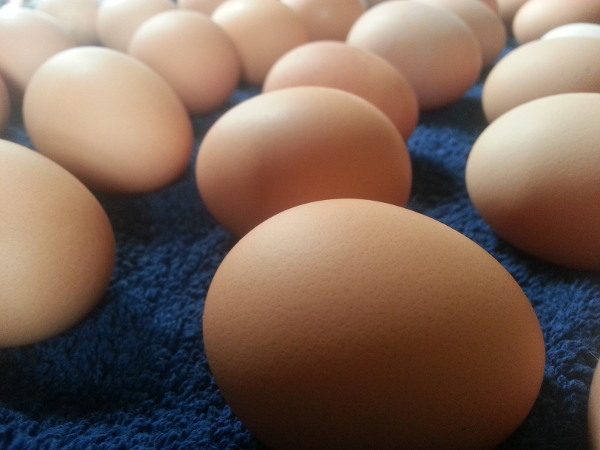
Photo by Swen Bos
When your chickens are laying well, sometimes you can start to get more eggs than you’re able to use. When you go to use the eggs in your recipes, it’s good to be able to tell which ones are getting old and which ones are still fresh.
Although it’s not obvious to the eye, eggshells are porous. Each egg has thousands of tiny pores in its shell. This allows the egg to “breathe,” letting out carbon dioxide and moisture and taking in air. When you consider that the role of an eggshell to protect and help provide a nurturing environment for a developing baby chick, then it’s easy to understand why eggshells are porous: a developing chick needs to be able to breathe.
When you get eggs from your chickens or from the grocery store for eating, ideally, you will store the eggs in such a way as to keep them fresh. A fresh egg that has just been laid has either a very small air cell or none at all. But as it first cools and then ages, an air cell will form and increase in size. The size of the air cell gives a good indication as to the age and freshness of the egg. A smaller air cell indicates a younger, fresher egg.
This makes it easy for you to test how fresh an egg is. Take a chicken egg and place it into a bowl of slightly warm water. If the egg is very fresh, it will sink and lie on its side at the bottom of the bowl.
An egg that sinks but doesn’t lie flat on the bottom isn’t as fresh, but it will still be okay to eat. Actually, eggs at this stage are ideal for cooking as hard boiled eggs (but not ideal for use as poached eggs). It’s hard to cleanly peel off the shell on a very fresh egg that’s been hard boiled, but if you let your eggs age a little, then hard boil them, they will be much easier to peel.
If the egg floats in the bowl of water, discard it. It’s unlikely that it will float on top of the water, but even if it just floats up toward the top of the bowl, it’s not very fresh, and you shouldn’t use it.
As a second test and a safeguard against ruining your recipe, if you’re getting ready to make something that calls for eggs and you come across an egg that’s questionable, crack it into a small, separate container, then look at it and smell it. If it smells rotten, discard it. If it smells okay, and if the yolk is holding together and the whites aren’t too runny, it should be fine to use. Egg whites that are cloudy are not at all a cause for concern — on the contrary, they indicate that the egg is very fresh. The egg whites become more clear as the egg ages.



When storing eggs in salt, how long should they last (covered in a box, unrefrigerated)? Also, what kind of salt and should the eggs be washed and dried first? This is an old method. Does anyone know the details?
for a 100 years now I’ve been doing this But in a pan or sink of cold water, to cover by over an inch? It’s always worked.
I have free range chickens and have used this method many times to determine if they were fresh or not. Free range birds as you may know occasionally decide to play hide and seek with their eggs instead of using the nesting box. My kids love trying this out!
Excellent article, Thank you.
Why do you mention about the yolk holding together? In my experience, if a yolk breaks apart in the bowl but there is no visible embryo, the (fertile) egg was set on by a hen for 1-2 days–not an issue of safety or freshness, but more an indication I was lazy and skipped a day of collecting my eggs. I still use them for myself, but I do not sell or give them away if I know they weren’t collected the day they were laid.
I have some hens that are older and wondered if some of my eggs were bad. Some eggs have yolks that break easy and the whites are clear and runny and they were just layed by a hen. These eggs tend to be thinner shelled too. Thank you for educating me!
Two friends who worked for the Peace Corps in different tropical climates told me that eggs were left on the counter – never refrigerated – and that as long as they were NOT refrigerated and then left out in the room again, that they stated “fresh.”
as for how long they could be good, I don’t know. Isn’t there a film on eggs deposited as they leave the hen, that seals the pores in the shell and thus keeps them from contamination?
I have free range chickens. The film that they secrete over the egg is call the bloom and it protects the embryo from contamination. When I collect the eggs I flick and dirt off of the egg but do not wash the egg. Instead I put the eggs in an egg carton and store them in the fridge. They will last up to 6 months as long as you do not wash them and keep the bloom on the egg. Eggs bought in the store have been washed and the bloom is no longer present which gives the shelf life of the egg about 3 months from the time of washing as long as they wash the egg the same day as it was laid. Now the question is how much time elapsed between the washing and the purchase. Your best bet is to buy the eggs fresh from the farmer.
I never refrigerate my eggs, but just leave them in a basket on the kitchen counter, out of direct sunlight, in a cooler location. We provide eggs to fellow Church members, and I’ve educated them on how to “float” an egg to determine freshness, and always caution to break ALL fresh eggs into a bowl prior to adding to a dish or recipe. We’ve had a few non-floaters that were just turning bad, and have saved the recipe using this precaution. Refrigerating eggs is not required, but once initiated, must be maintained. Our Amish neighbors do not refrigerate eggs, nor did my Grandmother. And I have to admit that if you do not “age” eggs for at least a week to 10 days prior to boiling, you will lose more egg to poor peel-ability than you will save.
I am purely guessing that the hen leaves a residue of some type on a fresh egg, because I’ve read a rinsed egg should be wiped with mineral oil if not immediately used. I rinse all our eggs, but do not wipe them with anything. This has not seemed to present any problems, and we have stored and used eggs as old as 3 weeks “fresh” on the counter.
if you want to age fresh eggs so you can make them easer for you to peel hard boiled, what is the best way to age them and how long does it take. thank you
Do fertilized eggs need to be chilled to keep?
IN England and Europe, eggs are never refrigerated. You buy them right off the shelf in the grocery store because eggs are delivered to the markets within a day or so of laying. Hens are not kept in batteries and eggs are not washed in chlorine. The natural film deposited by the hen on the egg protects it and all we do is wipe away any blemishes. Nest material is changed daily – or the hen chooses a new nest area. In this country the eggs can be sold in stores as old as SIX MONTHS after lay if stored at 40F.
I use this method all the time. I always date my eggs and store in fridge. But like the author said, if you get more then you can use and they have been sitting, check them and discard the old ones. Great info.
Thanks!
I just have to tell this. I was raised on a farm in the early 40’s and we had chickens of both sexes. My mother would sometimes ask my dad, if an egg was OK to cook. He would tell her the same thing, ” If it doesn’t have feathers, cook it!”
Besides the size of the air sack, there is another way to tell if an egg is fresh. Break an egg in a flat dish. If the yolk stands up and is round it indicates it is fresh. If the yolk spreads out and is flat it is older. Also, a fresh egg should have two distinct whites. One that is fairly firm and stands up a bit and the second is waterier and spreads out. Again if the white spreads out and is runny, it is an older egg.
One can “candle” an egg by placing it near a light bulb with a cone of heavy brown paper over the bulb. Place the egg in a circular hole at the small end of the cone. This will allow you to see the size of the air sack and also the position of the yolk. If the yolk is suspended in the center of the egg, the egg is fresh. If the yolk settles to the bottom of the shell it is older.
My chickens lay their eggs in a clean environment. So, I do NOT wash them. I believe washing them takes a natural protectant off the egg shell. I refrigerate cracked or washed eggs and use them in a few days. I have had clean eggs sit on my counter top for 2 months without a problem. If you break an egg into a small bowl before you use it, you’ll be able to keep egg shells out of your product and a quick sniff will tell you if you want to use the egg.
Sometimes we bring in fresh eggs and use them immediately. Occasionally, one or two of those eggs will have very watery whites. Is this common? What causes it, and how can I address this?
if an egg has a small crack after collection,or part of the shell is broken inward, but the inner membrane is still intact is the egg safe for human consumption?
I leave my eggs on the counter top and wash them just before I use them. When should I refrigerate eggs? Does that keep them fresh longer? How long can they be kept at room temperature before they are likely to go bad?
helpful hints. also if the egg is laying flat on the bottom its good, but also if it starts to lean to the top its bad or 3 – 4 weeks old. Not the best egg to use.
Really good information. Going to put this on the front of my refrigerator for every one to read.
Question: When should you refrigerate eggs? Does that keep them fresh longer? How long can they be kept at room temperature before they are likely to go bad?
One of the biggest reasons to refrigerate eggs as soon as possible is to reduce the growth of Salmonella. Any poultry can be infected with this and other organisms which are not very good for us, and cooling them as soon as possible greatly reduces the risks. Although completely cooking them also eliminates the problem too.
It also extends the shelf life of your eggs.
Could you please answer Calvin P Claxton, Jr.’s question for me? I sell eggs regularily and would like to know your answer to this. Thank you so much!
Refrigerate as soon as possible. Europeans rarely refrigerate their eggs but shelf life is no more than 30 days. Unwashed refrigerated eggs will remain fresh and edible for 3-4 months. This is because of what is called the bloom or protective covering on eggs. If you remove/wash the bloom off then refrigerated eggs will remain fairly fresh and edible for 60 days or so.